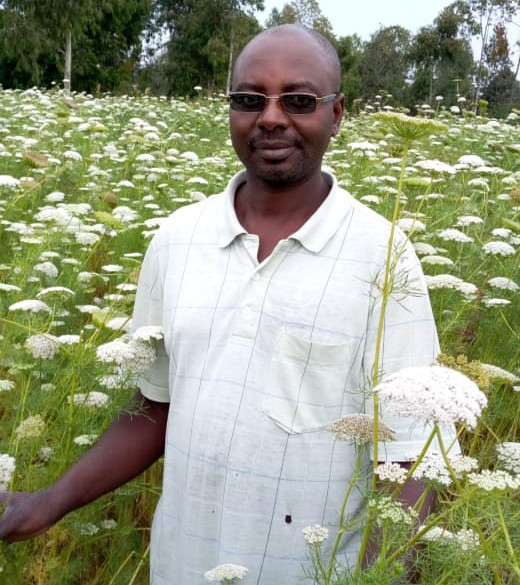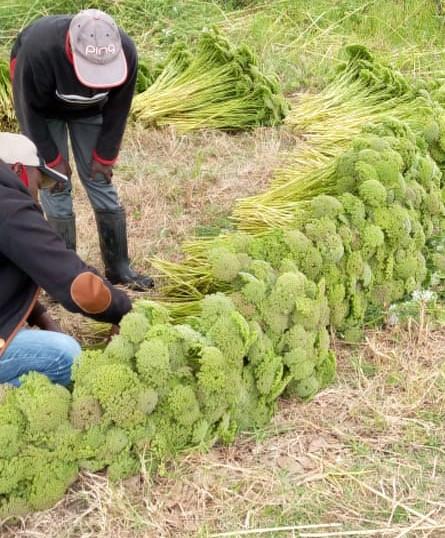From afar, the green, tall plants on the farm in Narumoro, Nyeri County appear like they are wearing a white helmet or a crown.
But what looks like the crown are white flowers that make the plant highly sought-after in the local and export markets.
The plants are Ammi flowers, which farmer Peter Mwangi Gicheru, who teaches biology and agriculture in a secondary school, grows and sells to an exporting company.
“A friend introduced me to the flower business, from which I bought 2kg of seeds and leased a quarter acre which I started with,” says Gicheru, who also keeps Kienyeji chickens, pigs and grows tree tomatoes.
According to Gicheru, the Ammi flower is easy to cultivate and manage and requires less water as compared to others.
“It thrives well on virgin land and doesn't require manure or fertilisers, only foliar feed once in a while and it's not attacked by animals or pests,” says Gicheru.
To plant the crop, he explains that one must prepare the land to a fine tilth, make shallow furrows at a spacing of 60cm apart, leave a path of 3ft and repeat the pattern on the entire land.
“If one can make raised beds on waterlogged soil, the better. Then broadcast seeds like it is done with carrots and cover with light soil and sprinkle water sparingly. Germination occurs in two to three weeks. The land must be kept weed-free and the flower supported when knee-high using poles and strings,” he explains.
Usage of drip irrigation is highly recommended and for quick flowering, one should apply foliar fertiliser.
“If you detect blight, spray them to curb the disease though it rarely attacks them. Then wait for flowers to reach the cut stage and look for the buyers, some will order specific length of stems, others will buy what you are capable of cutting. You need more people during harvesting because you must grade and cut them at the recommended stem size. One then bunches the stems together in groups of five or ten. If you don’t have a cold room, deep in water until the buyer collects.”
It has been about a year since he went into flower farming and the agriculture teacher says, so far, so good.
“Since I started, I have harvested the flowers, which come in two varieties, four times, getting over 4,000 stems that I sell at Sh4 each to an exporting company and to individual buyers.”
He sells the Ammi green varieties to Thika-based flowers company, which bulks the produce from small farmers like Gicheru and exports. He has recently started selling via Mkulima Young online market.
“The Ammi white variety I sell to an individual in Nairobi. The other day I sold 2,000stems though Covid-19 has affected prices.”
The varieties of the flowers, according to Gicheru, arise from the different stages of harvesting. When the plants are left for some time, they produce the white flowers, what some customers prefer while others want them green.
Gicheru diversified to flower farming having registered good returns with the poultry business that he started in 2018. Then, he was doing it for the love of farming but the diversification has helped him overcome the negative effects of Covid-19 as he grows his produce for the both local and export markets and he has a variety of produce to sell.
“I went into poultry keeping to practice what I teach my students. I also needed to change the mind-set of the community, to show them that they can do farming on their farms instead of waiting to work on neighbouring flower farms and make more money,” says the teacher, who feeds the birds on worms that he rears on his farm.
He also has 100 tamarillo fruit trees, a venture he went into in June last year. “I am now harvesting between 70 and 100kg every two weeks and sell the tree tomatoes at Sh80 per kilo.”
For pigs, he started with one pregnant sow and 20 piglets, 11 died and he remained with nine, with he reared and sold for pork.
“Now I have two mothers, just weaned some and sold nine. One mother is lactating and has 12 piglets and the orders for weaners are increasing by day. I have increased the size of pigsty as the business grows,” he says.
To contact Gicheru click here
Register with Mkulima Young for Free buying and selling. Click here to register


